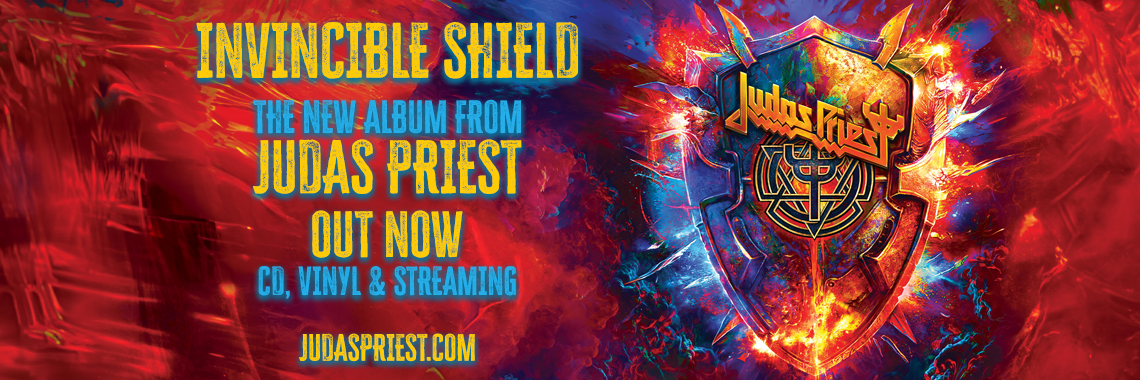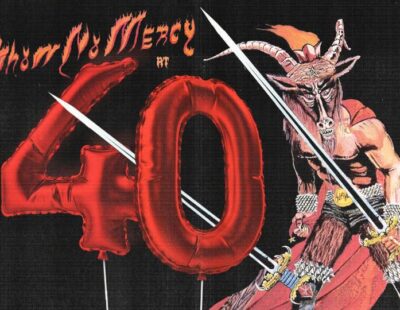
In metal, as in all forms of music and art, there is a constant tension between consistency and innovation. Should a well-established band stick to what it does best and try to refine that formula as much as possible? Or should all artists challenge themselves to push further into unknown territory, lest they become stale and tired as a result of creative stasis?
The short answer is: it depends. The longer answer takes some examination of real-world examples, the most salient one to me being Watain’s excellent Trident Wolf Eclipse, which is the band’s first album since 2013’s The Wild Hunt. Many readers will recall that album being met with mixed reactions from fans and metal writers alike. Those readers might want to listen to “Nuclear Alchemy” to see why they should be excited about this new album.
Keeping Criticism Realistic and Level-Headed
But let’s make a few things clear right at the outset. Bands owe nothing, musically speaking, to fans and listeners. Yes, when you pay for a concert ticket, the band should hold up its end of the bargain and put on a decent performance. Ontologically speaking, a concert requires a performer and an audience. Musical creation has no such requirement. Songwriting and composition are explicitly personal acts. A song can be written and recorded with no intention of having an audience to hear, critique and interpret that song. As Susan Sontag once wrote: “So far as he is serious, the artist is continually tempted to sever the dialogue he has with an audience…Silence is the artist’s ultimate other-worldly gesture: by silence, he frees himself from servile bondage to the world, which appears as patron, client, consumer, antagonist, arbiter, and distorter of his work.”
Erik Danielsson and his co-conspirators are under no moral or artistic obligation to alter their musical plans “for the fans, bro!” Century Media, their label, may feel differently, but as its mission is to get people to pay money for Watain’s music (which, as we’ve established, is not a necessary precondition to Watain making that music), its concerns are largely irrelevant here. We are not Watain’s artistic shareholders representing some Hobbesian leviathan in their musical boardroom. Who in their right mind would even want to be a musician if that were the case?
Yes, you are free to say that The Wild Hunt was not Watain’s best work, or that Morbid Angel’s Illud Divinum Insanus was a failed experiment, or that Slayer’s Diabolus in Musica was an ill-advised attempt to fit in with the musical norms of the late-1990s. I would agree with you in all of these cases. Christ, this is a music magazine, where the judgement, evaluation and dissection of this music might as well be the oxygen we breathe. But any deserved outrage and dissatisfaction about an album needs to adhere to some standards of humility and perspective.
The words “humility” and “perspective” are timely in December, 2017, which has seen the release of a new Star Wars film, The Last Jedi. Like a legendary metal band with a new album, any new Star Wars movie is bound to be divisive among fans (I’m still on the fence about it in some ways). But the furor over this film has hit new heights of absurdity, with some blinkered moviegoers going so far as to create and sign a Change.org petition to have Disney declare the movie “non-canonical” and create another one in its place. Yes, grown adults are actually doing this. Imagine having it so good that you have time in your day to pen sniveling and pathetic pleas to “let us keep our heroes,” as if they’re not available at a moment’s notice by re-watching the old movies.
I mention this to sketch out the worst way to critique an artist’s choice between consistency and experimentation. Now that we’ve established where the bottom is, let’s try and rise to a higher and more dignified standard.
Staying in Your Lane vs. Offroading
Some bands excel at playing a well-defined style and sticking to it. The examples will be obvious to most readers, but I’ll list a bunch of them anyway: Motörhead, Overkill, Cannibal Corpse, Deicide, Marduk, Suffocation, Incantation, Killswitch Engage, My Dying Bride, Goatwhore, Slayer and, of course, AC/DC. These bands each spent their first couple albums finding their sound and then perfected it, thus setting parameters that guided them through the rest of their career. For example, Slayer started out on Show No Mercy as an exciting and speedy blend of Mercyful Fate, Venom and Judas Priest. They then honed their riffing style and aesthetic on Hell Awaits and then perfected it (depending on how you feel about reverb) on Reign in Blood. South of Heaven and Seasons in the Abyss had more tempo changes, but they fall within the same framework.
Diabolus in Musica is no St. Anger, but it showed that when Slayer deviates too far from the pattern forged in Hell Awaits and Reign in Blood, they become less capable of making memorable songs worthy of repeated listens. God Hates Us All didn’t replicate the old sound completely, but was close enough to give us songs like “Disciple” and “God Sent Death.” Christ Illusion was even more of a self-conscious throwback that gave us “Cult,” “Black Serenade” and “Jihad.” But the pattern isn’t perfect, as the lackluster World Painted Blood and Repentless show in their mediocre non-glory.
To that very point, My Dying Bride was probably feeling bored with themselves after Like Gods of the Sun. So they took a risk with 34.788%…Complete. They promptly backed away from this with The Light at the End of the World and the fantastic The Dreadful Hours, thus charting a course for their late-career Renaissance. Alternatively, if a band’s formula gets too stale, they can still make some changes without producing a work of wasteful awkwardness. For a long time, from Heaven Shall Burn in 1996 and onwards, Marduk became associated with an almost constant blast-beating style of razor sharp black metal. With records like 2012’s Serpent Sermon and 2015’s Frontschwein, Marduk allowed the tempo to vary on more than one or two songs per record, thus bringing their sound (and probably the drummer’s left arm) to a more enjoyable place.
But then there’s a different kind of band. Some create a foundational album with threads nested within that allow the sound to travel elsewhere. Emperor helped define orthodox second-wave black metal (albeit with synths) on In the Nightside Eclipse, and then proceeded to move already existing elements further out with each album. Anthems to the Welkin at Dusk and IX Equilibrium saw the band go in a steadily more theatrical and polished direction until the band basically argued itself out of existence with Prometheus, commonly referred to as Ihsahn‘s first solo album.
Death set the indispensable template for old-school American death metal on Scream Bloody Gore. But the guitar parts already had a progressive touch that went beyond Possessed’s Seven Churches and pointed to the places Chuck would take listeners on Leprosy, Human and Symbolic. Not all Death fans like all of their albums, but each album at least has some devotees.
The Second Nightside Eclipse and Scream Bloody MORE would have felt gratuitous, and would have robbed us of the other influential albums both bands went on to make. On the other hand, Morbid Angel’s Covenant is very similar to Blessed Are the Sick, but this is a good thing. Covenant is more consistent and beats the previous album in terms of riffs and memorable song structures. Whatever possessed them to make Illud is a question for the voices in Trey’s head. Like I said before, it’s within their rights to try new things and take risks. It’s within mine to respectfully say it didn’t work out so well. Despite the production that resembles that sound when you’re driving down the highway with one window slightly open (you know what I mean), Kingdoms Disdained is a welcome return to what Morbid Angel is good at.
The wider point is that some bands, once they set the foundation for their sound, operate best within well-defined borders. Others have a sound that’s diverse enough in the first place that exploring only makes sense, as replication would spoil the enterprise. The former set of bands have to live with the fact that you either love them or don’t care for them (I love Slayer; I can take or leave AC/DC). Whereas the latter have to live with the fact that many fans are divided along certain albums or eras (I prefer Nightside to Prometheus; I love Between the Buried and Me, but mostly for the first three albums). Only a few bands are able to do a complete U-turn into doing something else successfully (Darkthrone after 2006) without making people think they should just change their name and get it over with (Opeth). Though there are cases where radical change is a matter of necessity, like blowing out your vocal chords (Katatonia, Avenged Sevenfold).
You could think of it like food dishes or even drinks. You can experiment a lot with a Margarita, from different flavors and types of tequila, to freezing it or not freezing it, or throwing in something carbonated to give it some bite. Whatever! You don’t need to experiment with a whiskey and coke. You can use better whiskey and you can swap in Pepsi, but there’s no reason to change the basic formula. Yes, you can throw in tomato juice and say “Look at how innovative I am, that means well-meaning writers should contort their judgement to say nice things about me!” But it wouldn’t change the fact that you just made something really gross.
So with that in mind, go ahead and pour yourself something nice and simple and get excited for Watain’s Trident Wolf Eclipse. Cheers.






